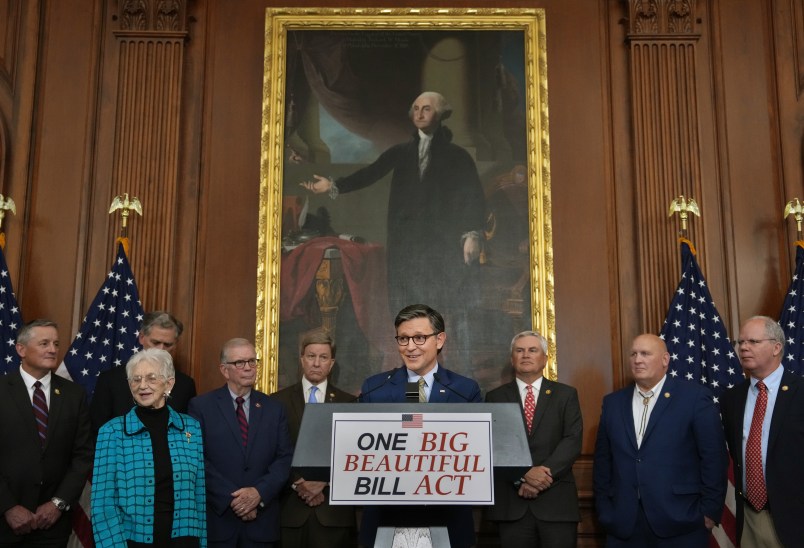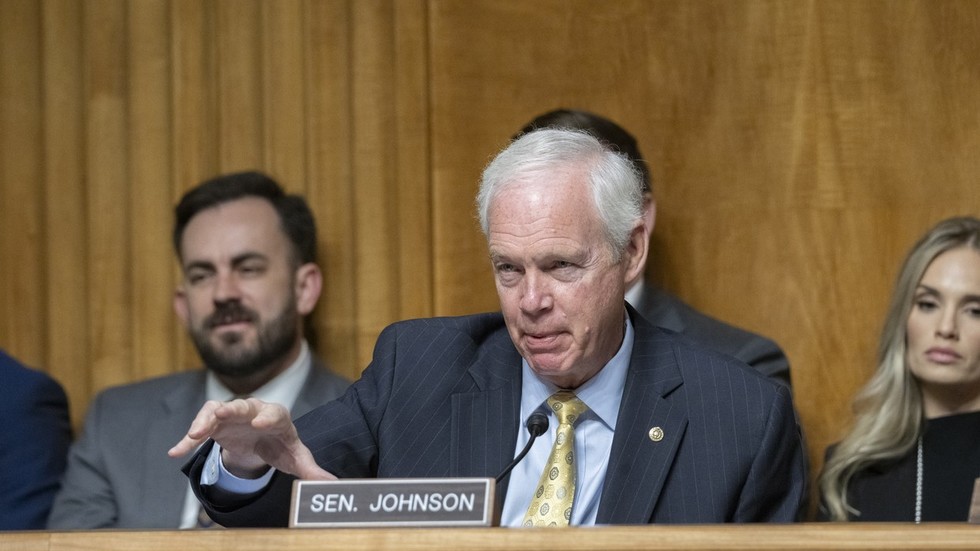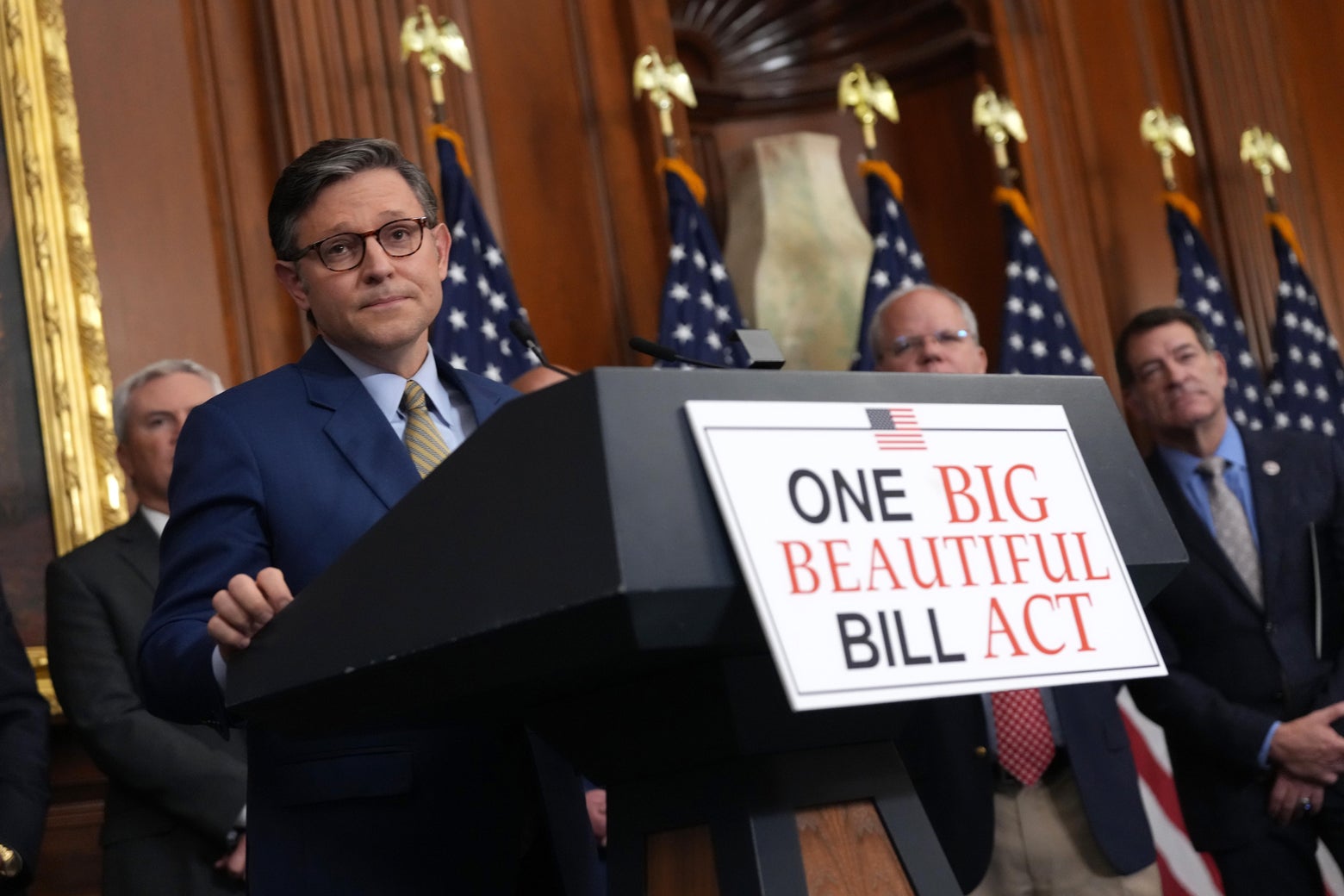US senate to investigate who really ran country under Biden
Senator Ron Johnson’s initiative comes amid speculation of a cover-up at the top after the ex-president was diagnosed with prostate cancer
Read more >> : Cick here
 |
 |
 |
 |
 |
 |
 |
House Passes Trump’s Reconciliation Bill After Shoving In Larger Medicaid Cuts At Last Minute
After weeks of intraparty fighting, House Republicans passed the reconciliation package that...

After weeks of intraparty fighting, House Republicans passed the reconciliation package that addresses President Donald Trump’s fiscal agenda in a largely party line 215-214 vote early Thursday morning.
Reps. Thomas Massie (R-KY) and Warren Davidson (R-OH) voted against the bill, joining all Democrats in opposing the package.
House Freedom Caucus Chair Andy Harris (R-MD) voted “present,” a decision that lowered the threshold for the “yes” votes needed by Republicans in order to pass it out of the lower chamber.
“I voted to move the bill forward along the process,” Harris said, according to Punchbowl. “I don’t think it was completely where I would need it to be. But it was a vote to move along. Obviously if I voted no, it would’ve gone nowhere today.”
Meanwhile, Reps. David Schweikert (R-AZ) and Andrew Garbarino (R-NY) did not vote. Garbarino reportedly fell asleep and missed the vote after sitting through proceedings all night.
The massive reconciliation package — which already included massive cuts to Medicaid and the popular food assistance program SNAP, as well as tax cuts that will largely benefit wealthy Americans — got a makeover on Wednesday largely to appease the far-right members who were threatening to sink the bill.
Notably, leadership made substantial changes to the Medicaid portion of the bill overnight.
The new text moves up the start date of Medicaid work requirements from Jan. 1, 2029 to Dec. 31, 2026. That was one of the demands members of the Freedom Caucus had been pushing since last week.
The bill already included a provision that banned coverage of gender-affirming care for minors. The new text extends that ban to adults under the program as well. Republicans also expanded the criteria for a provision that could cause states to lose a portion of the funds they receive through the federal matching rate if they offer coverage to undocumented immigrants.
Another notable change is expected to incentivize states not to expand their programs under the Affordable Care Act. A newly added measure would give states a financial incentive not to expand coverage outside of the traditional enrollees, making higher payments to providers, like hospitals, for uncompensated care.
The passage of the One Big Beautiful Bill Act comes after two obstinate factions of the House GOP caucus spent the past several weeks refusing to come together and support the package without assurances their competing demands would be met.
A group, largely made up of members of the House Freedom Caucus, had been pushing for steeper spending cuts and calling for leadership to move up the date for when Medicaid work requirements outlined in the legislation would kick in. Simultaneously, another group of largely blue-state Republicans have been unhappy with leadership’s state and local tax (SALT) offer, as well as provisions of the bill that would slash Medicaid.
House Republican leadership had been working with both sides to get everyone in line ahead of their self-imposed deadline: passing the bill out of the lower chamber by Memorial Day.
But they had to call in the real leader of the House Republican conference this week to ultimately pull that off.
On Tuesday morning, Trump attended a closed-door House Republican conference meeting in an attempt to strongarm both groups into accepting the offers they have received from leadership. He even called out a handful of Republicans by name during the meeting, telling them to get in line or else.
A handful of members came out of that meeting signaling to TPM and other reporters outside the room that the President had made significant progress with holdouts on both sides of the spectrum. But others also acknowledged more time was likely needed for negotiations.
That same night, House Speaker Mike Johnson (R-LA) and the blue-state Republicans reached a tentative deal on SALT as the Speaker agreed to boost the cap on state and local tax deductions to $40,000 for taxpayers making below $500,000 in the reconciliation package.
That agreement, which was endorsed by Trump, triggered a rebellion from far-right members who had been calling for steeper cuts to lower the deficit.
Johnson and House Freedom Caucus members went to the White House on Wednesday afternoon to work through their issues with Trump. That meeting and continued negotiations led to some of the major last minute revisions.
The bill will head to the Senate next where it is expected to face its own challenges.
Sen. Ron Johnson (R-WI) has already said he is a “no” on the bill in its current form, as it does not do enough to address the deficit. And Senate Republican leadership is considering taking the House’s package and chopping it up into pieces to make it easier to pass.
Johnson reportedly warned Senate Republicans against making major changes to the bill, as he barely whipped the votes he needed to pass it in the lower chamber. Any major changes might not withstand a second House floor vote.

Senator Ron Johnson’s initiative comes amid speculation of a cover-up at the top after the ex-president was diagnosed with prostate cancer
Read more >> : Cick here
 |
 |
 |
 |
 |
 |
 |

After winning his first NBA MVP award, Oklahoma City Thunder star Shai Gilgeous Alexander's mother left an emotional voicemail for her son.
Read more >> : Cick here
 |
 |
 |
 |
 |
 |
 |

GENEVA (AP) — Novak Djokovic advanced to the semifinals at the Geneva Open on his 38th birthday Thursday, beating the opponent who eliminated him at the Madrid Masters last month.
Djokovic rallied strongly in the second set for a 6-4, 6-4 win over 39th-ranked Matteo Arnaldi in their quarterfinals match.
The second-seeded Djokovic had smashed his racket into the ground behind the baseline after his serve was broken to trail 3-1 in the second set, when he sent a backhand long.
“I’m sorry for the racket, it’s not a good example particularly for the young ones,” Djokovic told the crowd in French in an on-court interview. “Thank for your support. I know that with the cold temperatures it’s not easy to stay here.”
At 4-1 down, and after seeming to strain his right knee stretching for a shot, Djokovic reeled off five straight games for victory.
He clinched his first match-point chance when Arnaldi hit a wild forehand from behind the baseline.
“It was much closer than maybe the scoring indicates,” Djokovic said.
On a chilly and rainy day that was tough for higher-ranked players, top-seeded Taylor Fritz lost to sixth-seeded Hubert Hurkacz 6-3, 7-6 (5), and fourth-seeded Karen Khachanov lost 4-6, 6-4, 6-4 to 128th-ranked Austrian qualifier Sebastian Ofner.
Djokovic’s semifinal opponent Friday will be the winner of the late match between Alexei Popyrin, the fifth-seeded Australian, and another qualifier, Cameron Norrie.
___
AP tennis: https://apnews.com/hub/tennis
Read more >> : Cick here
 |
 |
 |
 |
 |
 |
 |

Elias Rodriguez, of Chicago, told officers from the Metropolitan Police Department at the scene: â??I did it for Palestine, I did it for Gaza, I am unarmedâ??
Read more >> : Cick here
 |
 |
 |
 |
 |
 |
 |

Harvard says the move is ‘unlawful’ and ‘retaliatory.’
Read more >> : Cick here
 |
 |
 |
 |
 |
 |
 |

Bruce Springsteen’s clash with President Donald Trump became one of
Read more >> : Cick here
 |
 |
 |
 |
 |
 |
 |

Tax reform? More like “tax deform.”
Read more >> : Cick here
 |
 |
 |
 |
 |
 |
 |

Please, Minnesota senators and members of Congress, what are your plans for cutting the deficit?
Read more >> : Cick here
 |
 |
 |
 |
 |
 |
 |

BANFF, Alberta (AP) — Top finance officials from the world's seven wealthiest democracies set aside stark differences on U.S. tariffs and agreed to counter global “economic imbalances…
Read more >> : Cick here
 |
 |
 |
 |
 |
 |
 |

Many guests at Trump’s meme coin dinner have something to gain. Others are anonymous. Here’s what we know about attendees.
Read more >> : Cick here
 |
 |
 |
 |
 |
 |
 |

Are these two out athletes together? Here's what we know.
Read more >> : Cick here
 |
 |
 |
 |
 |
 |
 |

Are these two out athletes together? Here's what we know.
Read more >> : Cick here
 |
 |
 |
 |
 |
 |
 |

UPDATE: 1:20 p.m. Rapper Kid Cudi testified Thursday that Sean “Diddy” Combs broke into his Hollywood Hills home in 2011 after finding out he was dating Combs' ex-girlfriend, the R&B singer Cassie, and that someone set fire to his car weeks later.
Read more >> : Cick here
 |
 |
 |
 |
 |
 |
 |

Degraced 'Chuck' star Zachary Levi cannot stop talking about how people don't want to work with him anymore since he voted for Trump.
Read more >> : Cick here
 |
 |
 |
 |
 |
 |
 |

New York Attorney General Letitia James lashed out at the Trump Administration and claimed the criminal probe into her business dealings is an overreaction to
Read more >> : Cick here
 |
 |
 |
 |
 |
 |
 |
Twitter (X), Inc. was an American social media company based in San Francisco, California, which operated and was named for its flagship social media network prior to its rebrand as X. In addition to Twitter, the company previously operated the Vine short video app and Periscope livestreaming service
Twitter (X) is one of the most popular social media platforms, with over 619 million monthly active users worldwide. One of the most exciting features of Twitter (X) is the ability to see what topics are trending in real-time. Twitter trends are a fascinating way to stay up to date on what people are talking about on the platform, and they can also be a valuable tool for businesses and individuals to stay relevant and informed. In this article, we will discuss Twitter (X) trends, how they work, and how you can use them to your advantage.
What are Twitter (X) Worldwide Trends?
Twitter (X) Worldwide trends are a list of topics that are currently being talked about on the platform and also world. The topics on this list change in real-time and are based on the volume of tweets using a particular hashtag or keyword. Twitter (X) Worldwide trends can be localized to a Worldwide country or region or can be global, depending on the topic's popularity.
How Do Twitter (X) Worldwide Trends Work?
Twitter (X) Worldwide trends are generated by an algorithm that analyzes the volume of tweets using a particular hashtag or keyword. When the algorithm detects a sudden increase in tweets using a specific hashtag or keyword, it considers that topic to be trending.
Once a topic is identified as trending, it is added to the list of Twitter (X) Worldwide trends. The topics on this list are ranked based on their popularity, with the most popular topics appearing at the top of the list.
Twitter (X) Worldwide trends can be filtered by location or category, allowing users to see what topics are trending in their area or in a particular industry. Additionally, users can click on a trending topic to see all of the tweets using that hashtag or keyword.